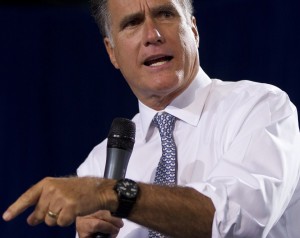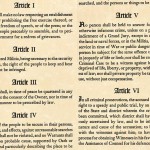 Fareed Zakaria, in his Time magazine piece, “The Heirs of Reagan’s Optimism,” makes the case — not new but worth revisiting — that in America the winning presidential candidate is usually the one whose party has a more optimistic tone — not blind optimism, but a kind of comfortableness with things:
Fareed Zakaria, in his Time magazine piece, “The Heirs of Reagan’s Optimism,” makes the case — not new but worth revisiting — that in America the winning presidential candidate is usually the one whose party has a more optimistic tone — not blind optimism, but a kind of comfortableness with things:
One perennial prediction about American elections remains likely to hold this November. The winning party will be the one that is more optimistic about America–even in the midst of a struggling economy…
Optimism in this sense is not a philosophy but more of a temperament, a comfort with the country’s eternal potential and a faith in its virtues. Reagan was the quintessential American optimist. He was an ardent conservative who wanted to turn sharply away from the liberalism of the 1960s and ’70s. But he was also a man who was clearly at home in the America of the ’70s — in Hollywood and in California, the diverse, complex, constantly changing state that he governed from 1967 to 1975.
While this may be a well-tested axiom, I think it’s especially relevant today. What is striking after watching both conventions is how the locations of hope and crankiness have flipped in recent years. The Democrats are now the party of optimism. I say this not as a partisan move, but as a frustrated observation. I believe this country would be far better served by two optimistic parties, with differing views but shared goals.
What has caused the shift, in my opinion, is simply time. The Boomers and much of Generation X have been locked in the “culture wars” for the last 40 years — on both sides. But for most Millennials, those battles are non-issues, and focusing on them is an instant turn-off. Despite living in a challenging time, they aren’t down; they are looking for answers and for reasons to be hopeful. And not just with politics. As I said in the post I wrote introducing this blog:
Whether within mainline churches or not, call them emergent or whatever, these new forms are full of faithful people trying to reconnect with what can make spiritual community a sustaining, grounding, core part of life, rather than a checklist item for Sunday morning.
Millennials don’t want to be told what to think; they want to be expected to think. They don’t want to be told the world has gone to hell; they want to be told how to make it better. (Unless we’re talking about the environment, in which case they are as doomsday as end times Christians.) The messages of exclusion and pessimism coming out of the Catholic Church, some mainline Protestant organizations and other conservative religious leaderships, like those from the Republican convention, are more than a turn-off to Millenials, in fact; they are a deal breaker.
The Democratic Party leadership has flipped over to the next generation; the Republicans are still hanging on to the past — McCain was a pre-Boomer and Romney is at the older end of the Baby Boom, born in 1947. At the RNC, Republican New Jersey governor Chris Christie, who is of Obama’s generation, stood out. Perhaps the Republicans thought Rep. Paul Ryan, who is even younger, would bring in the Millennial vote, but he is one of those younger people who’s fully invested in the old battles; and though his usual style is admirably solution-oriented, the campaign amazingly chose to waste that and use him as a conservative attack dog.
Long before the conventions though, these trends were obvious. (In the last election, John McCain was the epitome of crankiness.) Since spring, progressive friends have been asking me whether I thought it was likely Obama would lose and I’ve been telling them that actually I expect him to win easily, perhaps in a landslide. While the recovery is still sluggish, Republicans have doubled down on negativity, so I stand by that prediction. And now the polls are starting to bear it out. Nate Silver, the most respected polling analyst, now puts Obama’s chances of winning at 81%, gives the most likely electoral collage outcome as about 350-190, and struggles to find any scenario where Romney wins.
What happened?
In the 1970s, the Democrats were complaining about everything — from the war to the environment to nuclear power. It was the ascendancy of activist protest politics. Alongside that, the government they presided over seemed excessively bureaucratic and negatively oriented. Into this mess walked eternal optimist Ronald Reagan and George “Don’t worry, be happy” Bush. Today, I think few could argue, whatever their preference, that the Republicans are the cranky ones. They have discovered protest politics themselves, with a vengeance. And at their convention often they painted a dystopian present that is so removed from people’s everyday experience it seemed like a work of science fiction. Meanwhile, the Democrats talked in soaring hopeful rhetoric, like this from the president’s convention speech:
We, the people, recognize that we have responsibilities as well as rights; that our destinies are bound together; that a freedom which asks only, what’s in it for me, a freedom without a commitment to others, a freedom without love or charity or duty or patriotism, is unworthy of our founding ideals, and those who died in their defense.
As citizens, we understand that America is not about what can be done for us. It’s about what can be done by us, together through the hard and frustrating but necessary work of self-government. That’s what we believe.
(Are we sure Peggy Noonan, author of much beautiful prose including the 1980s Republican catch phrases “a kinder, gentler nation” and “a thousand points of light,” hasn’t secretly switched sides? Yes we are sure, because sadly she has been part of the cranky contingent in recent years.)
Of course, there was plenty of negativity and protest politics at the DNC, and there were plenty of uplifting messages at the RNC. And of course there’s a lot of hypocrisy in the flattering view the Dems have of themselves as the centrist big tent party, as brilliantly mocked by The Daily Show. (Thanks Mark Shea for that link.) But I’m talking overall tone.
The central themes of the two parties seem to be: Democrats = It will take a little more time, but thanks to American ingenuity and optimism, we’ll be back on top if you stick with us; Republicans = our president is a lying socialist and unless we revolt, we’ll be living in something like Soviet Russia within four years.
Zakaria points to Reagan’s cheerful demeanor and unwavering trust in the goodness of the American people as the ultimate example of optimism, but the shift began then also, with the beginnings of the “culture wars,” a phase of American politics that has run its course. As Republican senator Lindsey Graham famously said recently of future Republican prospects on its current trajectory: “We’re not generating enough angry white guys to stay in business for the long term.”
This is why I am hopeful. Not because I think the economy will be repaired by next year, or the Catholic Church will suddenly embrace the idea of married lesbian priests; I’m optimistic because I think the current and coming generations are interested in moving forward, in solving problems instead of bickering.












